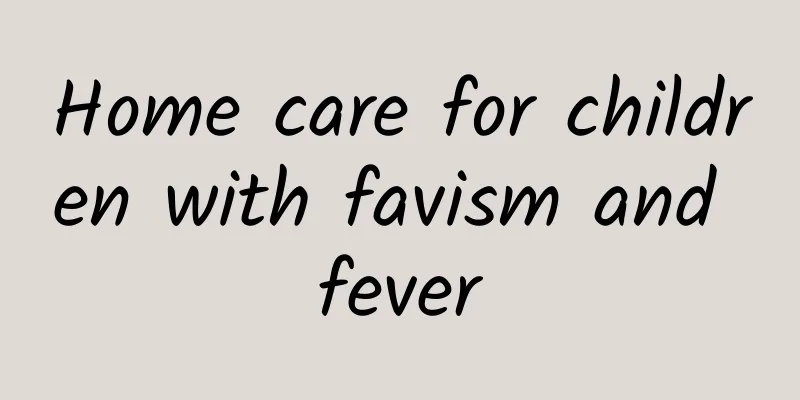Home care for children with favism and fever

|
This is the 3803th article of Da Yi Xiao Hu A few days ago, a mother came to consult me about her child's fever and cough. The child was a 3-year-old boy with a maximum temperature of 38.9℃. He went to the local hospital for a blood test and chest CT scan, but there were no abnormalities. He was diagnosed with acute bronchitis and was given azithromycin and Chaigui Antipyretic Granules for Children. After taking it for three days, he still had a fever, and the parents began to worry. In the detailed inquiry of the medical history, the parent mentioned: By the way, my child was told by the doctor that I have favism when he was born. Can I continue to take these medicines? What should I pay attention to? Let's learn with the same questions as this parent. one What is favism Favism, formerly known as erythrocyte glucose-6-phosphate dehydrogenase (G-6-PD) deficiency, is a hereditary disease in which red blood cells lack G-6-PD. When eating broad beans, broad bean products, or contacting broad bean fragments, the destruction of red blood cells is accelerated, resulting in acute hemolytic anemia. As shown in the figure above, it is OK for babies who are not deficient in this "shield" to eat broad beans. However, if children who are deficient in this "shield" eat related oxidative substances, they may develop acute hemolytic anemia, which is mainly manifested by pale complexion or jaundice, dark urine or even soy sauce-like urine, fever, chills, nausea, vomiting, abdominal pain, etc. If the baby is found during screening, the doctor will usually inform him and give corresponding life guidance, and inform the doctor of the disease every time he is sick. If the child is found later, he needs to go to the hospital as soon as possible for the doctor to diagnose and treat him to prevent further deterioration and complications. two Favism in children with fever Routine home care For children who have been confirmed to have favism, the family should be careful to avoid contact with broad beans, broad bean products and pollen. If a child has a fever on weekdays, in addition to going to the hospital, how should parents take care of the child? Parents often feel headaches. Some children have repeated fevers, and their body temperature does not drop despite treatment, so parents begin to panic. In addition to going to the hospital for treatment, the family should also do the following: 1 Cooling Use physical cooling methods, such as ice compresses or wiping the whole body with warm water (mainly armpits and thigh roots), and the wiping time is generally 15 minutes. Choose bedding according to the weather and the child's condition to prevent the quilt from being too thick or too thin. Change clothes in time after wiping to prevent further cold. In addition, please note that it is not recommended to use alcohol to wipe infants and young children. For children with high body temperature and ineffective physical cooling, it is best to take medication prescribed by a doctor. You can use a small amount of ibuprofen (Fenbid, Motrin Suspension, Motrin Mixed Drops), and do not take other types of antipyretics without authorization. Food and rest Encourage children to drink more warm water to replenish water and promote the excretion of metabolic products in the body; avoid eating broad beans or broad bean products and drugs with oxidizing properties, and eat mainly light and easily digestible food; try to rest in bed and avoid strenuous exercise; keep the air at home fresh and well ventilated. 3 observe Parents should always observe the baby's mental state, whether the bowel movements are smooth, whether the urine is normal, whether the amount is normal, whether the color is normal, observe the baby's breathing, whether there are abnormal sounds, skin color, appetite, abdominal pain (crying, pressing the abdomen), vomiting, etc. If there is any abnormality and parents cannot determine it, send the baby to the hospital for treatment in time. three Contraindications for medication in children with favism 1. Use some Chinese herbal medicines with caution, such as bezoar, bear gall, pearl powder, etc.; 2. Use antipyretics and anti-inflammatory analgesics with caution, and try to avoid using antipyretics that are not prescribed or notified by the doctor. When seeing a doctor, promptly inform the doctor of the history of favism. Antipyretics such as aminopyrine, pediatric antipyretic suppositories, antazoline, quinidine, and anti-inflammatory analgesics such as indomethacin and phenylbutazone in clinical drugs should not be used, as they may cause serious consequences. 3. Other drugs: Quinines, sulfonamides, furans, such as rifampicin, chloramphenicol, quinine, etc. should not be used. In short, be sure to inform your doctor promptly if you have a history of favism and carefully check the contraindications in the drug instructions. Let’s go back to the question raised by the parent at the beginning. Can azithromycin and pediatric Chaihu Antipyretic Granules be used for children with favism? The answer here is that they can be used. If parents are really worried about the drugs, they can check the drug-related ingredients and contraindications on the instructions. Some instructions may not be written very clearly, so the child’s condition must be observed after taking the medicine. If any abnormality is found, seek medical attention in time. The child’s blood routine and chest CT were initially normal. Currently, symptomatic treatment is the main treatment. The drugs given by the doctor are enough. At the same time, parents can do the routine home care mentioned above. Parents, have you learned the routine home care and precautions for children with fever due to favism? Author: Lan Yu, Department of Pediatrics, Shuguang Hospital Affiliated to Shanghai University of Traditional Chinese Medicine, Master's student. Research direction: Children's spleen and stomach diseases and endocrine diseases. Supervisor: Shen Jian, Department of Pediatrics, Shuguang Hospital Affiliated to Shanghai University of Traditional Chinese Medicine, Director of Teaching, Chief Physician. Doctor of Medicine, Master Supervisor. National TCM Innovation Key Talent of the "Hundreds of Millions" Talent Project for the Inheritance and Innovation of TCM by the Central Administration. His popular science monograph "The Wisdom of Traditional Chinese Medicine that Good Mothers Should Know" won the 10th Healthy China Forum and the First Annual Outstanding Popular Science Work Award. |
<<: How to improve immunity in summer
>>: Drinking 8 glasses of water a day almost made me blind! How to drink water healthily?
Recommend
What is the function of milk banana mask? How to make and consume milk banana mask
Night is the "golden time" for skin bea...
Is it okay to drink coconut water at 9.9 yuan per liter? The truth is revealed...
As the weather gets hotter, is your desire for co...
How to regulate acidic body constitution? Four moves are enough
The healthiest state of the human body is to achi...
National Nutrition Week | The construction of nutritious and healthy canteens helps office workers maintain nutrition and health
On December 4, 2020, the National Nutrition and H...
How to grow high-yield peanuts in the open air? The best time to use the three-time peanut pesticide
Peanut planting is relatively common, and a compl...
What should I do if my pregnant woman has high anti-thyroglobulin antibodies?
After pregnancy, all physical indicators of femal...
Why does it hurt when women urinate?
We all know that patients with prostate problems ...
What should girls do if they have no pubic hair? Girls must know
It is a very common phenomenon for girls to have ...
What to do about vaginal dryness? Girls must know!
The vagina is not only an important organ for fem...
China Bone Health Popular Science Guide
Bone health runs through a person's life and ...
What are the traditional Chinese medicine prescriptions for preventing and treating pregnancy?
Recently, many pregnant mothers have not paid spe...
Will my breasts swell and hurt after conception?
After pregnancy, pregnant mothers will find some ...
The yolk sac and dot-shaped embryo bud are visible
Nowadays, people's living standards are const...
How to make pearl powder mask to remove blackheads
Blackheads are very stubborn open comedones. Ther...
How big is the baby in one month of pregnancy and what to pay attention to
The issue of how big the baby is after one month ...









